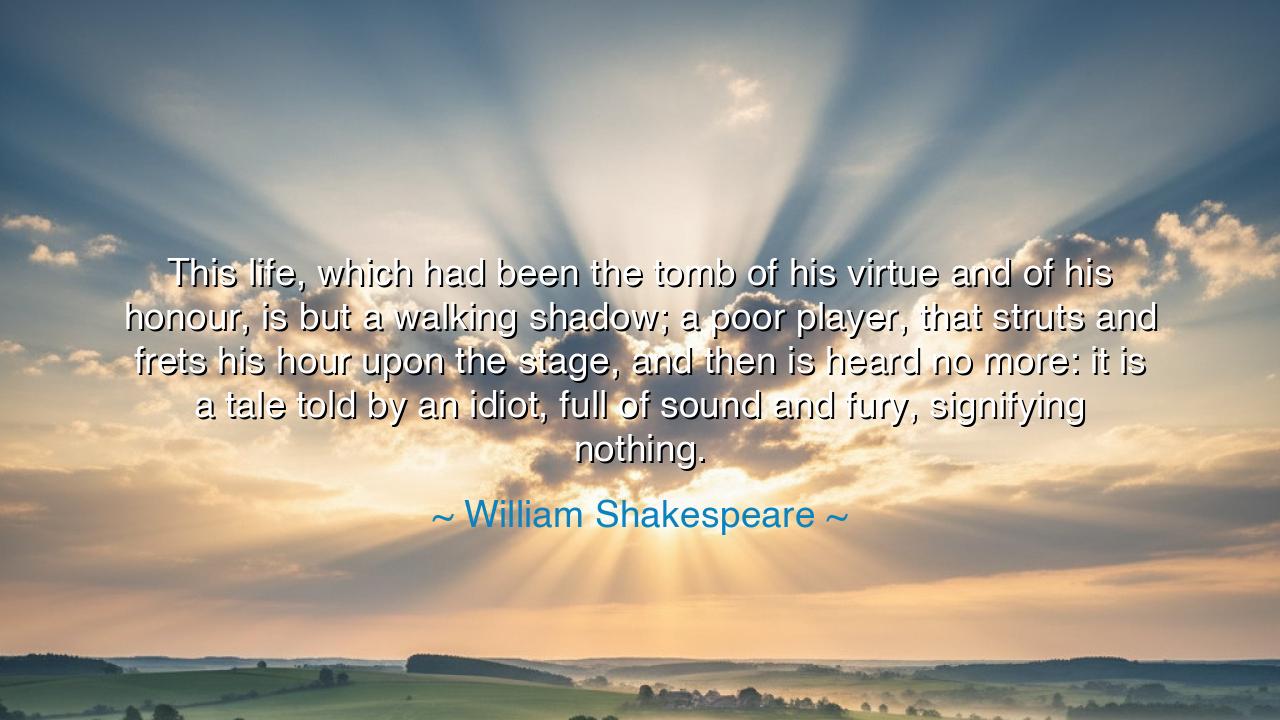
This life, which had been the tomb of his virtue and of his
This life, which had been the tomb of his virtue and of his honour, is but a walking shadow; a poor player, that struts and frets his hour upon the stage, and then is heard no more: it is a tale told by an idiot, full of sound and fury, signifying nothing.






When William Shakespeare wrote these immortal lines — “This life, which had been the tomb of his virtue and of his honour, is but a walking shadow; a poor player, that struts and frets his hour upon the stage, and then is heard no more: it is a tale told by an idiot, full of sound and fury, signifying nothing” — he was not merely weaving poetry, but unveiling the eternal despair of the human condition when purpose is lost. These words, spoken by Macbeth after learning of his wife’s death, come at the height of his ruin, when all ambition, power, and pride have turned to ashes. Once a noble man, his soul now hollowed by guilt and blood, he sees life itself as meaningless — a shadow play of vanity and noise, destined to fade into silence.
This speech, born from Shakespeare’s Macbeth (Act V, Scene V), stands as one of the most profound meditations on existence and futility in all of literature. In it, Macbeth, once a warrior of honour, now stands upon the precipice of despair. His dreams of glory have become nightmares, his crown a curse. Having seized the throne through treachery and murder, he finds no peace, only emptiness. The “tomb of his virtue and honour” is his own life — for in gaining the world, he has lost his soul. The grandeur of his rise, filled with “sound and fury,” now reveals itself as a performance — a “poor player” acting upon the world’s stage for a fleeting moment before vanishing into the void.
To call life a “walking shadow” is to recognize the illusion that veils existence — that our struggles, triumphs, and passions, though vivid in the moment, are but brief flickers against the eternal darkness. The “poor player” that struts and frets is man himself, who believes his performance matters, who shouts and weeps and rages, yet whose voice is swallowed by time. Shakespeare’s genius lies not only in his poetry, but in his understanding of the human soul — that when stripped of hope, faith, and meaning, even the mightiest heart trembles before the emptiness of being.
History is filled with the echoes of such despair. Consider the story of Napoleon Bonaparte, who rose like a comet across Europe, conquering nations and reshaping empires. For a time, he seemed to command the destiny of the world. Yet in exile on the lonely island of St. Helena, broken and forgotten, he too saw the futility of his own grand tale. The “sound and fury” of cannon and crown faded into silence. Like Macbeth, he came to see that without moral purpose, all glory ends in nothingness. For the empire of the spirit, not the empire of men, is what endures beyond the stage of time.
But though these words may seem drenched in darkness, their truth is not despair — it is awakening. Shakespeare does not say life is nothing; he says that life without meaning becomes nothing. When ambition, greed, and pride consume the heart, existence loses its sacred fire. The cure is not to reject life, but to redeem it through purpose — through love, integrity, and virtue. The man who acts only for power performs for an empty theatre; the man who acts for truth plays before eternity.
Thus, the lesson of Shakespeare’s lament is this: though the stage of life is brief, we must play our part with dignity and with soul. The world may forget our names, but not the goodness we create. Each life, however short, can burn with light rather than fade as shadow. The wise understand that though all men must vanish, not all lives are meaningless. Meaning is forged not in the applause of the crowd, but in the quiet purity of one’s deeds — in courage, compassion, and faith.
So, my child, when you feel the darkness of Macbeth’s despair, remember this: life is a fragile performance, but you are free to choose how it is played. Do not strut and fret for vanity’s sake, nor chase crowns that crumble. Instead, live with purpose, and your shadow will become light to others. Speak truth, love deeply, act justly — and though your hour upon the stage may end, your story will not be “signifying nothing,” but echoing through the ages as a testament to the soul that found meaning in the fleeting miracle of life.






AAdministratorAdministrator
Welcome, honored guests. Please leave a comment, we will respond soon